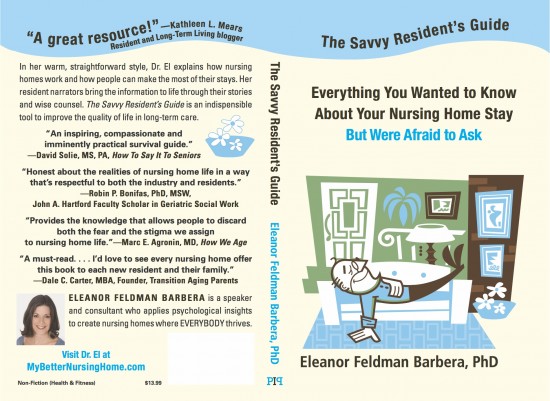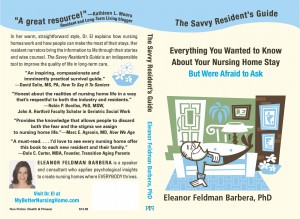Category: Common Nursing Home Problems and How Psychologists Can Solve Them
Posted by Dr. El - May 17, 2013 - Business Strategies, Common Nursing Home Problems and How Psychologists Can Solve Them, Customer service, McKnight's Long-Term Care News, Motivating staff, Something Good About Nursing Homes

Here’s my latest article at McKnight’s Long-Term Care News:

In long-term care we spend a lot of time focused on the physical health of those in our care. With increased emphasis on culture change and the update to the MDS (and hopefully as a result of this column), we’ve begun to address the mental health of our residents more adequately.
We do this not only by assessing the needs of individuals, but also by creating a healing emotional environment for all residents. It’s easier for our staff members to create an emotionally healing environment for residents when the work environment is psychologically healthy for them.
What makes a psychologically healthy workplace?
The American Psychological Association (APA) Center for Organizational Excellence recognizes five different elements that contribute to a healthy environment:
- Employee involvement includes efforts to involve employees in decision-making and give them more opportunity for autonomy.
- Work-life balance is a recognition that responsibilities outside work can impact on performance on the job, leading to programs that assist workers in managing childcare, eldercare, financial crises, etc.
- Employee growth and development focuses on offerings that provide employees with the opportunity for new skills and experiences such as coaching or mentoring, continuing education, tuition reimbursement, etc.
- Health and safety comprises programs that work to maximize employees’ physical and emotional health such as stress management programs, adequate insurance, healthy lifestyle motivators, safe practices training on the job, and Employee Assistance Programs (EAPs).
- Employee recognition includes ceremonies that acknowledge individual and group contributions to the organization, performance-based bonuses and pay increases, and acknowledgement of milestones.
The benefits of a psychologically healthy workplace
According to the APA Center for Organizational Excellence, which has been honoring exemplary company practices since 1999, having a healthy workplace isn’t just good for employees. A psychologically healthy environment can reduce staff turnover and absenteeism, improve performance, and enhance the quality of services provided.

Posted by Dr. El - May 3, 2013 - Business Strategies, Common Nursing Home Problems and How Psychologists Can Solve Them, Communication, End of life, McKnight's Long-Term Care News, Motivating staff, Psychology Research Translated

Here’s my latest article at McKnight’s Long-Term Care News:
I started working in long-term care when I was in my early 30s and I was shocked at first when the residents died. I was used to falling in love with my patients — I consider it a prerequisite for psychotherapy. I wasn’t used to them dying on me.
In the years since, I’ve lost many, many people who have touched my heart, but I can still remember very clearly the ones who passed when I was new. In order to make it in LTC, I’ve protected myself by falling in love in a different way.
A recent New York Times article, “Is Giving The Secret of Getting Ahead?”, piqued my interest when it touched on the impact of death anxiety at work, suggesting that it could have an effect on absenteeism and turnover. Working with residents in LTC is all about coping with death, and facilities have huge problems with absenteeism and turnover —surely there was a connection. I raced through the article, located the research paper it mentioned, “The Hot and Cool of Death Awareness at Work,” and plowed through that too. What I read seemed very applicable to long-term care, so I’m going to present the gist of the research and ways to reduce absenteeism and turnover based on these ideas.
Mortality cues
In “The Hot and Cool of Death Awareness at Work,” authors Grant and Wade-Benzoni outline different types of work where mortality cues can be chronic or acute, internal or external to the job, and personal or vicarious. A firefighter, for example, is constantly in a work situation that threatens his life. This would be considered a chronic, internal, personal mortality cue. A nursing home employee would have a chronic, internal, vicarious mortality cue because they are repeatedly exposed to other people at work who are dealing with end-of-life issues.
Reactions to mortality cues
The authors state that there are two different reactions to being aware of death at work. A “hot” reaction leads to self-protection and “stress-related withdrawal behaviors” such as absenteeism, tardiness, and turnover. A “cool” reaction leads to prosocial behaviors such as helping, mentoring, and thinking of work in the context of contributing to society. They refer to the hot reaction as “death anxiety” and the cool reaction as “death reflection” and note that chronic exposure to mortality cues can shift a worker from death anxiety to death reflection.
This shift from death anxiety to death reflection describes my experience as I continued in long-term care. It also explains why some new workers bail out early and others persevere to become beacons of light in a challenging environment. In addition, the researchers propose that as we age, we become more likely to experience death reflection rather than anxiety. Younger workers, therefore, are more likely to withdraw from the nursing home environment.
Retaining new young workers
________________________________________________________________________________________
Coping with Grief, for Staff Members: Conversation with grief expert Courtney Armstrong, LPC
 Beloved residents decline and then die, their families stop visiting the nursing home — coming to terms with these losses is an unacknowledged challenge of our work. Especially helpful for training directors, new employees, or those struggling with a current loss either on or off the job, this 20-minute audio will help staff members:
Beloved residents decline and then die, their families stop visiting the nursing home — coming to terms with these losses is an unacknowledged challenge of our work. Especially helpful for training directors, new employees, or those struggling with a current loss either on or off the job, this 20-minute audio will help staff members:
- Understand their feelings
- Recognize symptoms of grief
- Identify coping skills
- Assist each other in creating a supportive community
Includes FREE:
- Signs of Grief checklist
- LovingKindness Meditation Sign suitable for posting at the nursing station
Instant Download: Only $7.99

Posted by Dr. El - March 12, 2013 - Common Nursing Home Problems and How Psychologists Can Solve Them, Depression/Mental illness/Substance Abuse, McKnight's Long-Term Care News, Resident care, Role of psychologists

I’m very pleased to announce the debut of my new column at McKnight’s Long-Term Care News. The World According to Dr. El is a twice monthly column that will address mental health issues in LTC.
Please visit and “Like” the page on McKnight’s to show your support for addressing the mental health concerns of all those involved with LTC.

Inside the mind of an LTC shrink
I sat in morning report as the nursing supervisor announced the arrival of a new resident. An 80-year old woman was taken to the hospital after a fall at home, where she received a below-knee amputation and contracted C. diff before being transferred to our facility.
I looked around the room and speculated about what each of my team members were thinking, imagining thought bubbles over their heads:
- The wound care nurse was wondering how the leg was healing.
- The rehab director was considering the chances an 80-year old woman might be able to manage on a prosthetic leg.
- The infection control specialist was mentally reviewing a checklist of infection control procedures that needed to be put in place.
- The social worker was hoping the woman lived in a ground-floor apartment.
What was I thinking about this new admission? I was worried she might be suffering from symptoms of Post-Traumatic Stress Disorder if she had been alone on the floor for any length of time after her fall.
I pondered how she might be handling the assault on her femininity of losing a leg. I wondered about the quality of her family supports and whether she’d consider attending the choir performance where one of the soloists was a glamorous amputee from the third floor.
Posted by Dr. El - October 25, 2012 - Common Nursing Home Problems and How Psychologists Can Solve Them, Talks/Radio shows, Tips for gifts, visits


Please join me as I speak with Dale Carter of Transition Aging Parents on her BlogTalkRadio show on Monday, November 5th at 8pm ET. We’ll be discussing my new book, The Savvy Resident’s Guide, and ways in which to help residents thrive in nursing homes. The show will be a great resource for family members in particular, providing tips for helping loved ones adjust to a long-term care stay. If you’re a facility looking for ways to improve relationships with families, let them know about this show which will offer a balanced insider view of nursing homes and how to work within the system to meet the needs of residents.
For more information about the half-hour radio show, visit Helping Your Aging Parent Thrive in their Nursing Home. To listen to the show, visit the page on Monday, November 5th at 8pm ET and click on the arrow button below my photo. To ask questions, use the call-in number listed there.
10/29/12 Update: Due to Hurricane Sandy, we are rescheduling this show for 11/5/12.
Posted by Dr. El - October 24, 2012 - Business Strategies, Common Nursing Home Problems and How Psychologists Can Solve Them, Customer service, Depression/Mental illness/Substance Abuse, Talks/Radio shows

Where was I last week and why didn’t I update my blog as usual? I was in Denver, speaking about Mental Health in Nursing Homes at the National Aging Services Risk Management conference sponsored by Caring Communities, Peace Church Risk Retention Group, and ECRI Institute. I addressed the fact that facilities are exposing themselves to multiple risks if they aren’t providing appropriate mental health care, and I offered practical, low- or no-cost ideas on how to improve mental health treatment in long-term care settings. The talk was recorded and will be available to ECRI Institute members at their website: ecri.org. In their words: ECRI Institute is an independent, nonprofit organization that researches the best approaches to improving the safety, quality, and cost-effectiveness of patient care.

Posted by Dr. El - October 10, 2012 - Business Strategies, Common Nursing Home Problems and How Psychologists Can Solve Them, McKnight's Long-Term Care News, Transitions in care


Here’s my latest guest post on McKnight’s Long-Term Care News:
Long-term care psychologists are a valuable resource for facilities looking to reduce their hospital readmission rates. As the only team member whose role it is to sit and talk with the residents for an extended period of time on a regular basis, psychologists are privy to a relationship that can help address root causes of readmission such as medication noncompliance and the recognition and timely reporting of symptoms, as well as follow-through with medical appointments after discharge.
Psychologists can:
1. Notice mental status changes before other staff members. Because interactions are based on extended conversations with residents, psychologists are frequently able to spot subtle alterations in cognition that wouldn’t be noticed during a med pass or routine caregiving.
2. Discover previously unreported symptoms. Due to the amount of time psychologists spend with the residents and the level of trust that develops in the psychotherapeutic relationship, residents often reveal important symptoms of their illnesses they might not share with medical staff.
3. Gather information from communication-challenged residents. Psychologists can gather info from residents who speak slowly or need to use communication devices and then share it with the team, saving staff time and providing important details.
For more, visit McKnight’s LTC News:
__________________________
For more on how nursing home psychologists can help those in LTC:
Free Audio: Interview by Psychotherapist Bill O’Hanlon
In this audio, mental health expert Bill O’Hanlon talks with Dr. El about the role of nursing home psychologists and how their work can transform facilities and improve the lives of residents, families, and staff members.
Free Download!

____________________
Now available on Amazon:
Everything You Wanted to Know About Your Nursing Home Stay
But Were Afraid to Ask
Posted by Dr. El - September 10, 2012 - Common Nursing Home Problems and How Psychologists Can Solve Them


It’s been my lifelong wish to publish a book, so I’m excited and couldn’t wait for the official book launch to tell you about it. If you think The Savvy Resident’s Guide might be useful for someone you know, please spread the word. Many thanks to all of you who helped me reach this point and thanks in advance to those of you who offer the book to those who need it.
About The Savvy Resident’s Guide:
The Savvy Resident’s Guide explains how nursing homes work and how people can make the most of their stays. This large-print guide is the only book available that is directed specifically toward residents. Its calm, pragmatic approach will reassure readers and give them practical tools for handling a nursing home stay.
Families will find answers to many of their own questions about nursing homes in The Savvy Resident’s Guide. Reading the stories of the resident narrators will help family members understand what Mom or Dad worries about after they’ve left for the day.
Staff can use The Guide as a helpful adjunct to their work since it answers questions without requiring staff time. It’s a ready reference book that makes an ideal addition to the admissions package.
Students of many disciplines — nursing, psychology, social work, rehab, medicine, etc. — will benefit from this overview of life in long-term care. They’ll gain insight into the typical concerns of nursing home residents and absorb a person-centered approach to managing these concerns.
For more information and to order the book, visit The Savvy Resident’s Guide: Everything You Wanted to Know About Your Nursing Home Stay But Were Afraid to Ask
Posted by Dr. El - August 9, 2012 - Common Nursing Home Problems and How Psychologists Can Solve Them, Talks/Radio shows, Technology

Last weekend I was in Orlando, Florida for the American Psychological Association conference, where I spoke as part of a symposium on Social Media in Long-Term Care Settings. We discussed concerns around maintaining privacy and confidentiality, as well as the use of social media to improve care. Of course, I talked about my blog, how it developed, recommendations for those considering beginning their own blogs, and ways in which I’ve used my blog for therapeutic purposes with the residents. Below you can see me with co-presenters, Drs. Keely Kolmes, Geoff Lane, Mary Lewis, and Pat Bach, who are all psychologists experienced in the use of social media in health care.

Posted by Dr. El - July 26, 2012 - Common Nursing Home Problems and How Psychologists Can Solve Them, Depression/Mental illness/Substance Abuse, Resident care, Role of psychologists


The New York Times New Old Age blog has an interesting, hopeful article by Paula Span regarding treatment for depression in older adults. Regarding the stigma of psychotherapy the article mentions, I’ve found nursing home residents to be very receptive to my visits, especially when I phrase my help as “extra support during a stressful time.” Everyone agrees that entering a nursing home is stressful. (See my earlier post, The Stress of Nursing Home Admission, for more on this.) Occasionally, when someone is resistant but I can tell they need me, we postpone the decision to officially start psychological services and I tell them I’ll “just stop by next week to see how things are going.” Nine times out of ten, they’re glad to see me and appreciative that I showed up when I said I would.
Here’s the start to the New Old Age post; click on the title below to read the whole article:
Anna Hill’s mother-in-law had suffered from depression for years, it was clear in hindsight, and had denied it for years, too. Only 73, she’d lost interest in doing much of anything. In chronic pain after an earlier accident, she was taking high doses of methadone. Last November, she stunned her family by declining, at the eleventh hour, to come to Thanksgiving dinner.
“I’d only seen her in a nightgown for a year straight,” said Ms. Hill, 42, an accountant in Atlanta. “She was just rotting away in bed, watching TV and taking methadone.”
Depression in the elderly is a mixed picture these days.
For years, mental health specialists lamented that depression was seriously underdiagnosed and undertreated in the elderly. Laypeople saw it not as a disease but as an inevitable part of aging. Doctors missed it because depression didn’t always look the way it did in younger patients — less sadness and weepiness, more physical symptoms and disengagement. Older people themselves often rejected help because mental illness carried a stigma.
In primary care practices, Dr. Jürgen Unützer and colleagues found in a large study published in 2000, only 12 to 25 percent of older people with probable depression were getting a diagnosis and being treated.
Not anymore. Over the past decade, “we’ve seen a really big increase in the recognition of depression and the initiation of treatment,” said Dr. Unützer, a geriatric psychiatrist now at the University of Washington.
For more, click on title of article above.
Posted by Dr. El - July 5, 2012 - Business Strategies, Common Nursing Home Problems and How Psychologists Can Solve Them, Communication, Customer service, Engaging with families


Here’s my latest article in Long-Term Living magazine online:
Family members: 5 ways to turn fault finders into fans
For most families, entry into a nursing home is like being teleported onto a strange new planet. The arrival is often swift and unanticipated, and the customs are foreign and frequently unnerving. Think back to your first days in long-term care, subtract your training, add a sick loved one and consider from that vantage point what services you can offer to improve the experience of anxious family members. Here are five ideas to get you started:
1. Provide essential information up front.
Your admissions packet probably includes the basics already, such as a copy of the residents’ rights and information on how to finance a nursing home stay and how to file a grievance. Consider going beyond the essentials to provide helpful details such as the names of the nurses, aides, doctors and social workers, and the fact that, for example, nurses wear white and aides wear blue and what the difference is in their roles in the facility. Anticipate the need for other information such as the location of the business office or how the discharge process works.
2. Offer emotional support via family meetings.
Nursing home entry is an extremely stressful event in the life of a family. Family members may consider nursing home placement to be “the beginning of the end” and be experiencing anticipatory grief as they look toward losing their loved one, even though the loss might be many years away. Most families are negotiating the added life tasks of trying to decide what’s best for Mom and perhaps selling a home or dispersing a lifetime of possessions. Family disagreements are common. Nursing homes that offer supportive and informative sessions run by the social worker or psychologist, with community referrals as needed, are more likely to be viewed with gratitude for meeting this unspoken need than to become targets of misplace anxiety and rage. Examples of meeting topics could include “understanding dementia,” “supporting your loved one during nursing home placement” and “coping with changing family dynamics.” In addition, offering information on illnesses such diabetes, provided by a knowledgeable staff member or by a local representative of an organization such as the American Diabetes Association, can improve the compliance of families with residents’ special diets and reduce conflict with staff (and residents) around this issue.
3. Support the family council.





 Beloved residents decline and then die, their families stop visiting the nursing home — coming to terms with these losses is an unacknowledged challenge of our work. Especially helpful for training directors, new employees, or those struggling with a current loss either on or off the job, this 20-minute audio will help staff members:
Beloved residents decline and then die, their families stop visiting the nursing home — coming to terms with these losses is an unacknowledged challenge of our work. Especially helpful for training directors, new employees, or those struggling with a current loss either on or off the job, this 20-minute audio will help staff members:














